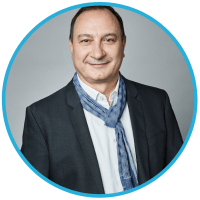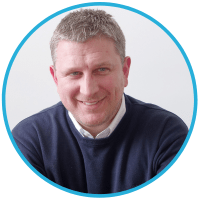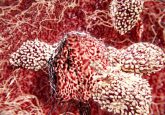Tackling disparities in cancer care across Europe: how can we improve access for all patients in Europe?

This article has been commissioned and funded by BeiGene
Introduction
Improving equitable access to cancer care is an urgent priority in Europe. Significant disparities exist across the continent, with patients facing challenges accessing care, information and support, as well as treatments and research. Everyone in the healthcare ecosystem has a role to play in identifying disparities and delivering solutions to ensure we are better meeting the needs of all patients and improving outcomes across the board.
In this discussion, Gerwin Winter, SVP (Head of Europe) at global biotechnology company BeiGene (Basel, Switzerland), and Eric Low, Director of ELC (Eric Low Consulting) and a leading representative of the rare cancer and hematology patient community, explore some of the key access disparities in Europe and offer potential solutions to optimize care provision.
This discussion covers issues relating to equality of access (all patients getting the same access) and equity of access (all patients getting the treatment and care they need in alignment with their specific clinical and personal needs).
What are the causes behind the access disparities we see in Europe, and how do they impact patients?
Gerwin Winter: While we have made important progress in Europe, significant inequities in access and standards of care exist across the continent. If we consider new medicines, access varies from 4 months to almost 2 years post-market authorization across countries and regions [1]. There is a clear divide in play, with wealthier, Western European countries receiving much quicker access to new medicines compared to less wealthy, Eastern European countries. In Germany, the average time between the approval of a medicine and when it reaches patients is 133 days, whereas in Romania it is significantly higher at 899 days [2].
We have often fostered this within industry by pursuing reimbursement in the wealthiest countries first. This has led to an overreliance on the revenue from a select few affluent countries to sustain business models and drive innovation. Consequently, new medicines are increasingly unaffordable and inaccessible, especially in poorer countries, contributing to delayed access and, in turn, poorer patient outcomes [3]. We need to rebalance the established norms and develop a more access-driven approach that puts the needs of all patients first, wherever they live in Europe.
Beyond economic aspects, systemic factors, such as slow and complex regulatory and reimbursement processes and rigid evidence requirements from health technology assessment (HTA) bodies, also present challenges. This is despite the standard set by the COVID-19 blueprint, which showed that flexible collaborations between industry and authorities could speed up patient access to new medicines.
Eric Low: The causes behind the health disparities we see in Europe are complex, multifaceted and wide-ranging, and impacted by global, regional and local factors. All stakeholders are implicated in one way or another. Still, there has been a lack of acceptance of responsibility and genuine collaboration to understand and solve the causative factors, meaning finding solutions has been incredibly challenging.
As Gerwin describes above, there are disparities regarding access to treatment due to the evidence being initially designed and developed to answer regulatory questions for the US FDA and the US market, and then subsequently being used to seek reimbursement in countries where decision-makers need evidence to answer completely different questions and where the willingness to pay thresholds are very different.
While issues like a lack of funding are significant at a national level and often attract attention, they must be considered part of a wider ecosystem of challenges affecting patients. Funding by itself does not deliver equitable access for cancer patients and may mask underlying and entrenched issues. The US spends the highest percentage of GDP on healthcare of any country globally, yet patient outcomes lag significantly behind this [4]. Funding must be supported by strategic nous and robust implementation frameworks to optimize impact and improve patient outcomes, especially for rare cancers.
One issue rare cancer patients frequently encounter is difficulties in accessing and participating in clinical trials. Patients often live large distances from clinical trial centers and, therefore, cannot participate. The issues with this are two-fold: firstly, patients may not be able to benefit from the treatment being trialed, and secondly, trials in rare cancers often take longer to complete, meaning patients need to wait longer to get access to approved treatments in clinical practice.
While access to research is often concentrated on whether a country has access to new treatments, many other factors impact how patients access ‘holistic’ healthcare, such as socioeconomic disparities [5], cultural and language barriers, and health literacy issues [6], particularly amongst migrant, vulnerable and minority groups. One review has found that language barriers in primary care often exist due to a lack of interpreters and the limited cultural competence of practitioners [7].
Consequently, patients’ experiences of their healthcare and the outcomes they receive from it are vastly different, and the health disparities listed above directly impact their overall quality of life and survival outcomes.
Why is it essential that we tackle access disparities in Europe now?
Gerwin Winter: Fundamentally, we must act now as cancer remains a global threat – approximately 10 million people die from the disease each year worldwide, making it the second leading cause of death [8,9]. In the EU, an estimated 2.7 million people are diagnosed with cancer annually, and with an increasingly aging society, this number is expected to grow [10].
The industry is making strides forward in developing new treatments for rare diseases and personalized medicine. This means that patients who have previously had no treatment options are now receiving life-changing medication. However, we need to shift the perception that developing innovative medicines alone is enough. The ultimate goal must be patient access.
Eric Low: We owe it to patients to do so; we have been letting them down for too long. While much of the hype and media surrounding cancer is often around finding a cure, there are other pressing priorities in helping all patients get access to available treatments and care that could save lives today.
The COVID-19 pandemic exposed the impact of health disparities on health outcomes in a way that had not been done before, but we need to act now, or we risk losing the opportunity. Additionally, as cancer treatment becomes increasingly specialized and personalized, such as with cell and gene therapies, which are likely to be incredibly expensive and have scalability issues for the foreseeable future, access to treatment disparities across Europe may well be exacerbated further.
What steps can we take to improve access to cancer care for all in Europe?
Gerwin Winter: The industry has historically focused on registering medicines in higher-income markets that maximize economic gains before other markets, entrenching access disparities. Evolving this approach to simultaneously build capabilities in underserved regions of Europe is essential to providing universal access to novel and investigational treatments.
From a BeiGene perspective, we have committed to making our medicines available to as many people as possible, regardless of location. Consequently, we have avoided the traditional ‘economic-first’ model and instead prioritized a collaborative approach to pricing and reimbursement requirements that has resulted in rapid patient access, often faster than industry averages.
To Eric’s point on patient access to research programs, industry must do more to increase patient input on trial design and endpoints and increase patient participation from underserved regions and minority communities, regarding diversity and rarity. By improving cancer research and data collection in this way we can identify disparities and develop tailored interventions that support access equity.
We also need to expand early access programs to let patients use promising new medicines before full marketing authorization. Industry can lead this, but countries should adopt flexible regulatory policies and mechanisms. The European Medicines Agency (EMA) is increasingly assessing medicines based on earlier data, and by making HTA and regulatory processes across Europe more adaptable, we can foster more equitable access, particularly for rare cancers.
The European Commission is proposing reforms to the General Pharmaceutical Legislation*(GPL) to speed up patient access to medicines approved centrally by the EMA. One proposal is to introduce “launch conditionality”, which would require medicines to be available in all 27 EU Member States within 2 years of marketing authorization. However, given the complexity of price and reimbursement negotiations across health systems in each Member State, we believe that the GPL should incorporate a gated approach to launch conditionality. This would allow companies to file for price and reimbursement simultaneously across all EU Member States before a punitive deadline is considered.
Eric Low: Given the causative factors involved in the health disparities across Europe regarding cancer care, information, support, treatment and research, to name a few, solutions must be thoughtful, implementable, and transactable.
It’s beyond any stakeholder’s scope, remit and responsibility to solve all the problems. Many of the things outlined by Gerwin are pragmatic and commendable. There is a lot more that the pharmaceutical industry could and should be doing to improve access to treatment, for example, by generating a broader evidence base to answer questions for a variety of decision-makers beyond the regulator.
Academic research groups should also think more about how the design, and subsequently the results, from their research could offer standard-of-care/real-world evidence in countries where we know the local HTA body will need it. Government and medical research funders should play a role in incentivizing this hybrid and de-risking approach to research, and patient organizations should advocate strongly for it.
On a practical level, patient organizations should think about how they could improve disparities locally and nationally by developing therapeutic area-relevant Holistic Needs Assessments and Shared Decision-Making Frameworks.
Healthcare systems or hospitals must also deliver education and training programs to support healthcare professionals. Programs should particularly focus on improving cultural competency to ensure that patients across all communities and backgrounds are supported according to their clinical and personal needs. This can include hiring bilingual staff, implementing a standardized language bank, using universal signs and symbols and offering interpreter services.
Governments and health authorities must invest in public health campaigns to raise awareness and understanding about cancer prevention, early detection and treatment options, particularly amongst vulnerable and marginalized communities, to help tackle cultural barriers.
Particular attention should be given to remote and underserved regions with limited access to healthcare facilities, where telemedicine and digital health technologies can be leveraged to allow patients to access cancer care and even clinical trials without the need for extensive travel. Working in partnership with patient organizations, data on the lived experience of cancer patients from these communities can be collated to better inform policy design.
* Proposal for a Regulation of the European Parliament and of the Council laying down Union procedures for the authorisation and supervision of medicinal products for human use and establishing rules governing the European Medicines Agency, amending Regulation (EC) No 1394/2007 and Regulation (EU) No 536/2014 and repealing Regulation (EC) No 726/2004, Regulation (EC) No 141/2000 and Regulation (EC) No 1901/2006).
What’s next?
The message from Gerwin and Eric is clear. Ultimately, there is no one-size-fits-all solution to address European access disparities in cancer care. However, with the cancer burden in Europe set to grow further, it is essential to acknowledge the causes and act now to address them. Positively, we still have the opportunity to make these steps. By collaborating across the healthcare community, we can ensure that all patients in Europe have equitable access to high-quality cancer care.
Author profiles:
 Gerwin Winter
Gerwin Winter
SVP, Head of Europe, BeiGene
Gerwin Winter joined BeiGene in March 2021 as Senior Vice President, Head of Commercial, Europe. In this role, he is responsible for building and leading the commercial team in Europe and operations that will bring BeiGene’s innovative medicines to patients in Europe.
Gerwin has worked in the pharmaceutical industry for nearly three decades, with a strong focus on hematology and oncology. Most recently, Gerwin was Senior Vice President and Head of Europe for Portola Pharmaceuticals, building European operations from scratch from January 2019 through its acquisition by Alexion in late 2020. Previously, Gerwin served in a progression of several General Management roles at Celgene (6 years) and Bristol-Myers Squibb (12 years) where he was responsible for multiple launches in hematology for Revlimid® (lenalidomid), Imnovid® (pomalidomid), Vidaza® (azacitidin), Sprycel® (dasatinib), and Abraxane® for breast, lung, and pancreatic cancer.
Gerwin founded “SAIL in Bhutan” in 2018, a non-profit healthcare organization, aiming to prevent gastric cancer in an entire country. He received a PharmD in pharmacy from the University of Munich, Germany, and a General Management MBA from CEDEP at INSEAD University of Fontainebleau, France.
 Eric Low
Eric Low
Eric Low Consulting
Eric has worked in medical research, market access and patient organizations for over 25 years. He set up Myeloma UK in 1996, leading the organization as Chief Executive until 2017. He currently runs a consultancy business specialising primarily in strategic market access, life sciences and healthcare policy, patient and patient group engagement. Eric also holds several Board, honorary, advisory and voluntary positions. He also advises numerous medical and health-focused charities on a pro bono basis.
References
1 Kamphuis B, Fontrier AM, Efthymiadou O, Gill J, Salyga H, Kanavos P. Access to medicines in Europe. 2021. Available at: www.lse.ac.uk/business/consulting/assets/documents/Access-to-medicines-in-Europe-Final-Report.pdf (Accessed September 2023)
2 European Federation of Pharmaceutical Industries and Associations. Back innovation, boost access. 2023. Available at:
www.efpia.eu/about-medicines/access-to-medicines/back-innovation-boost-access/
(Accessed September 2023)
3 Jansen C, Amesz B. Every day counts – The impact of COVID-19 on patient access to cancer care in Europe. 2021. Available at: www.efpia.eu/publications/downloads/access-to-medicines/every-day-counts-the-impact-of-covid-19-on-patient-access-to-cancer-care-in-europe/
(Accessed September 2023)
4 Gunja M, Gumas E, Williams, R. U.S. Health Care from a Global Perspective, 2022: Accelerating Spending, Worsening outcomes. 2023. Available at: www.commonwealthfund.org/publications/issue-briefs/2023/jan/us-health-care-global-perspective-2022 (Accessed September 2023)
5 World Health Organization. Social determinants of Health. Available at: www.who.int/health-topics/social-determinants- of-health#tab=tab_1 (Accessed September 2023)
6 Health Literacy Europe. Consensus Paper, Making health literacy a priority in Europe. Available at: www.eu-patient.eu/globalassets/policy/healthliteracy/health-literacy-consensus-paper_2016.pdf (Accessed September 2013)
7 Evenden R, Singh N, Sornalingam S, Harrington, Paudyal P. Language barriers for primary care access in Europe: a systematic review. Eur. J. of Public Health. 32 Suppl 3 (2022)
8 World Health Organization. World Cancer Day: closing the care gap. 2022. Available at:
www.who.int/news/item/03-02-2022-world-cancer-day-closing-the-care-gap
(Accessed September 2023)
9 Cancer Research UK. Worldwide cancer statistics. 2023. Available at: www.cancerresearchuk.org/health-professional/cancer-statistics/worldwide-cancer
(Accessed September 2023)
10 European Commission. Keynote Speech by Commissioner Stella Kyriakides at the 2022 World Cancer Congress (UICC) Plenary Session. Available at: https://ec.europa.eu/commission/presscorner/detail/en/SPEECH_22_6270
(Accessed September 2023)
In association with:
The opinions expressed in this article are those of the author and do not necessarily reflect the views of Oncology Central or Future Science Group.




